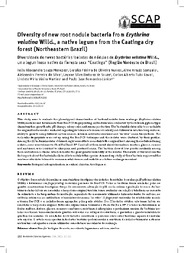Diversity of new root nodule bacteria from Erythrina velutina Willd., a native legume from the Caatinga dry forest (Northeastern Brazil).
Diversity of new root nodule bacteria from Erythrina velutina Willd., a native legume from the Caatinga dry forest (Northeastern Brazil).
Author(s): MENEZES, K. A. S.; NUNES, G. F. de O.; SAMPAIO, A. A.; SILVA, A. F. da; SOUZA, L. S. B. de; GAVA, C. A. T.; MARTINS, L. M. V.; FERNANDES JUNIOR, P. I.
Summary: This study aims to evaluate the phenotypical characteristics of bacterial isolates from mulungu (Erythrina velutina Willd.) nodules and determinate their Box-PCR fingerprinting. All bacteria were evaluated by the following phenotypic characteristics: growth rate, pH change, colony color and mucus production. The bacterial isolates able to re-nodulate the original host were also evaluated regarding its tolerance to increased salinity and different incubation temperatures, ability to growth using different carbon sources, intrinsic antibiotic resistance and ?in vitro? auxin biosynthesis. The molecular fingerprints were set up using the Box-PCR technique and the isolates were clustered by their profiles. Among the 22 bacterial isolates obtained, eight were able to re-nodulate the original host. Among the nodule inducing isolates, some were tolerant to 1% of NaCl and 39° C and all of them metabolized the maltose, fructose, glucose, sucrose and arabinose, were resistant to rifampicin and produced auxin. The bacteria showed low genetic similarity among them and reference strains, which indicates the great genetic variability of the isolates. The results of this work are the first reports about the bacterial isolates able to nodulate this species. A more deep study of these bacteria may reveal the existence of isolates tolerant to environmental stresses and suitable as a future mulungu inoculant.
Publication year: 2016
Types of publication: Journal article
Unit: Embrapa Semi-arid Region
Observation
Some of Embrapa's publications are published as ePub files. To read them, use or download one of the following free software options to your computer or mobile device. Android: Google Play Books; IOS: iBooks; Windows and Linux: Calibre.
Access other publications
Access the Agricultural Research Database (BDPA) to consult Embrapa's full library collection and records.
Visit Embrapa Bookstore to purchase books and other publications sold by Embrapa.

